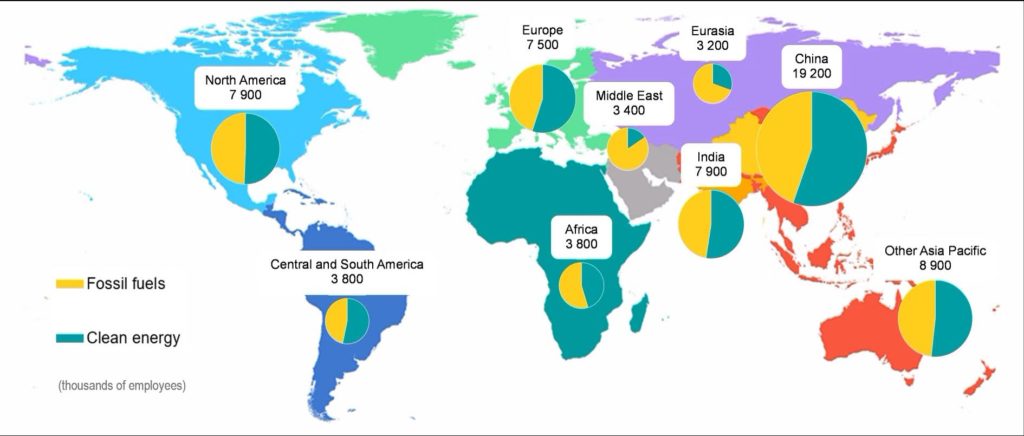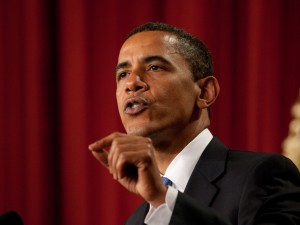By Rick Knight
Question: Does making fossil fuels more expensive eliminate jobs?
Answer: No. Cutting fossil fuel emissions actually puts more people to work than business as usual at comparable wages.
Fossil fuel employment has been shrinking for years, mainly because of mechanization, not regulation. For example, in 1980, producing 100 tons of coal per hour required 52 miners; by 2015 that number dropped to 16. Even though more coal was being mined, coal mining lost 58 percent of its jobs between 1980 and 2015.
According to the 2019 U.S. Energy & Employment Report, in 2018 there were 2.4 million jobs in clean energy generation and energy efficiency, compared to half that many in fossil energy production. Even without a price on carbon, installers and service technicians for solar and wind are forecast to grow 11 to 13 times faster than the U.S. average. Also, the vast majority of energy sector jobs, such as electricians, power plant operators, riggers, etc., are needed for both fossil and non-fossil energy.
Our country will still need energy, whether it comes from low- or zero-carbon sources or from the old polluting sources of the past. Today, the energy technologies of the future create more well-paying jobs per energy dollar spent, and will continue to do so even as the new technologies mature. Consider that renewable electricity is already cost-competitive with fossil-generated power in many locations, and it becomes even clearer that investment dollars will continue to flow to the generation resources that create the most jobs.
And it’s not just renewable energy jobs! A 2017 study of a carbon tax in British Columbia that reroutes most revenue to taxpayers showed that, over a six-year period, job gains in labor-intensive sectors like health care outweighed job losses in energy-intensive sectors like air travel. There were more employment opportunities with the carbon tax than without it.
In a nutshell: Clean energy and energy efficiency actually puts more people to work, at comparable wages, than continued fossil fuel extraction. If a carbon fee is part of the policy portfolio and revenue is used for carbon cash-back payments to households, this also stimulates job growth in businesses outside the energy sector.
Deeper dive: One of the reasons climate action is difficult is that incumbent industries that extract and/or depend on fossil fuels find it easy to argue that strong climate policy will kill jobs. That’s an argument that plays on emotion, but it’s not really supported by facts.
The past: Fossil fuel employment has been shrinking for years, mainly because of mechanization, not regulation. For example, in 1980, producing 100 tons of coal per hour required 52 miners; by 2015 that number dropped to 16. Between 1980 and 2015, even though more coal was being mined, coal mining lost 58 percent of its jobs. This clearly debunks any claim that some kind of government-run “war on coal” is responsible for lost jobs in that industry.
The present: The 2022 International Energy Agency report cited above shows that, worldwide, clean energy already provides half of all energy jobs, and that opportunities in climate-friendly sectors “represent the highest employment creation potential.” In North America, the clean energy proportion is slightly higher at 51% of energy jobs. This metric does not include vehicle manufacturing because, as the IEA report itself puts it, “EVs could be roughly as labour-intensive across the entire value chain.”
Focusing on the U.S., the 2019 U.S. Energy & Employment Report lists 2.39 million jobs in clean energy generation and energy efficiency versus 1.23 million – half as many – in fossil energy production. Another 1.36 million energy jobs were in cross-cutting sectors like transmission, distribution, and energy storage which are technically independent where the energy comes from.
In 2020, CCL Research Coordinator Jerry Hinkle wrote a blog post on this topic. One study he cited compared the wages and benefits of clean energy jobs in the U.S. to the national average as well as to those in the fossil fuel industry. It showed that median wages for clean energy careers were 25% higher than the national median and are more likely to come with health and retirement benefits than the rest of the private sector. Salaries in clean energy were comparable to fossil fuel job salaries.
The future: As for future U.S. job growth prospects, installers and service technicians for solar and wind are forecast to grow 11 to 13 times faster than the U.S. average. Also, the vast majority of energy sector jobs, such as electricians, power plant operators, riggers, etc., are needed for both fossil and non-fossil energy. And those growth forecasts do not account for increased ambition in climate policy, such as robust carbon pricing, which would surely accelerate the demand for workers that support a clean transition.
So what about carbon pricing?: Jerry Hinkle’s blog post also cited a study where Harvard and Tufts University economists, using a World bank dataset, measured the impact of carbon pricing in 31 European countries over the prior 30 years. While those policies caused employment to shift away from industries that pollute more, they increased them in the emerging clean energy economy. Far from being “job killers,” the net effect on employment growth was slightly positive, particularly in the early years.
Further on carbon pricing, British Columbia was one of the first jurisdictions to explore a carbon tax that reroutes most revenue to taxpayers (via tax credits in this case.) A 2017 study of this policy showed that, over a six-year period, job gains in labor-intensive sectors like health care outweighed job losses in energy-intensive sectors like air travel. There were more employment opportunities with the carbon tax than without it.
Bottom line: Every objective line of evidence shows that a transition from fossil energy to renewable and low-carbon energy will maintain both the quantity and quality of careers in the energy sector. This finding also holds true when clean energy growth is stimulated with carbon pricing, especially if the revenue is shared with households.
Continue learning on our podcast
Read more about clean energy and our climate solutions:
- Building Electrification and Efficiency
- Healthy Forests
- Clean Energy Permitting Reform
- Carbon Pricing





